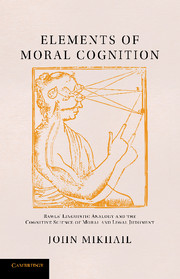 Elements of Moral Cognition
Elements of Moral Cognition Book contents
- Frontmatter
- Contents
- List of Tables and Figures
- Preface
- PART ONE THEORY
- PART TWO EMPIRICAL ADEQUACY
- 4 The Problem of Descriptive Adequacy
- 5 The Moral Grammar Hypothesis
- 6 Moral Grammar and Intuitive Jurisprudence: A Formal Model
- PART THREE OBJECTIONS AND REPLIES
- PART FOUR CONCLUSION
- Appendix: Six Trolley Problem Experiments
- Bibliography
- Index
6 - Moral Grammar and Intuitive Jurisprudence: A Formal Model
Published online by Cambridge University Press: 07 September 2011
- Frontmatter
- Contents
- List of Tables and Figures
- Preface
- PART ONE THEORY
- PART TWO EMPIRICAL ADEQUACY
- 4 The Problem of Descriptive Adequacy
- 5 The Moral Grammar Hypothesis
- 6 Moral Grammar and Intuitive Jurisprudence: A Formal Model
- PART THREE OBJECTIONS AND REPLIES
- PART FOUR CONCLUSION
- Appendix: Six Trolley Problem Experiments
- Bibliography
- Index
Summary
A critic who wished to say something against that work [Groundwork of the Metaphysic of Morals] really did better than he intended when he said that there was no new principle of morality in it but only a new formula. Who would want to introduce a new principle of morality and, as it were, be its inventor, as if the world had hitherto been ignorant of what duty is or had been thoroughly wrong about it? Those who know what a formula means to a mathematician, in determining what is to be done in solving a problem without letting him go astray, will not regard a formula which will do this for all duties as something insignificant and unnecessary.
– Immanuel Kant, Critique of Practical Reason[In] our science, everything depends upon the possession of the leading principles, and it is this possession which constitutes the greatness of the Roman jurists. The notions and axioms of their science do not appear to have been arbitrarily produced; these are actual beings, whose existence and genealogy have become known to them by long and intimate acquaintance. For this reason their whole mode of proceeding has a certainty which is found no where else, except in mathematics; and it may be said, without exaggeration, that they calculate with their notions.
– F. C. Von Savigny, Of the Vocation of Our Age for Legislation and JurisprudenceThe demand is not to be denied: every jump must be barred from our deductions. […]
- Type
- Chapter
- Information
- Elements of Moral CognitionRawls' Linguistic Analogy and the Cognitive Science of Moral and Legal Judgment, pp. 123 - 180Publisher: Cambridge University PressPrint publication year: 2011
- 1
- Cited by


